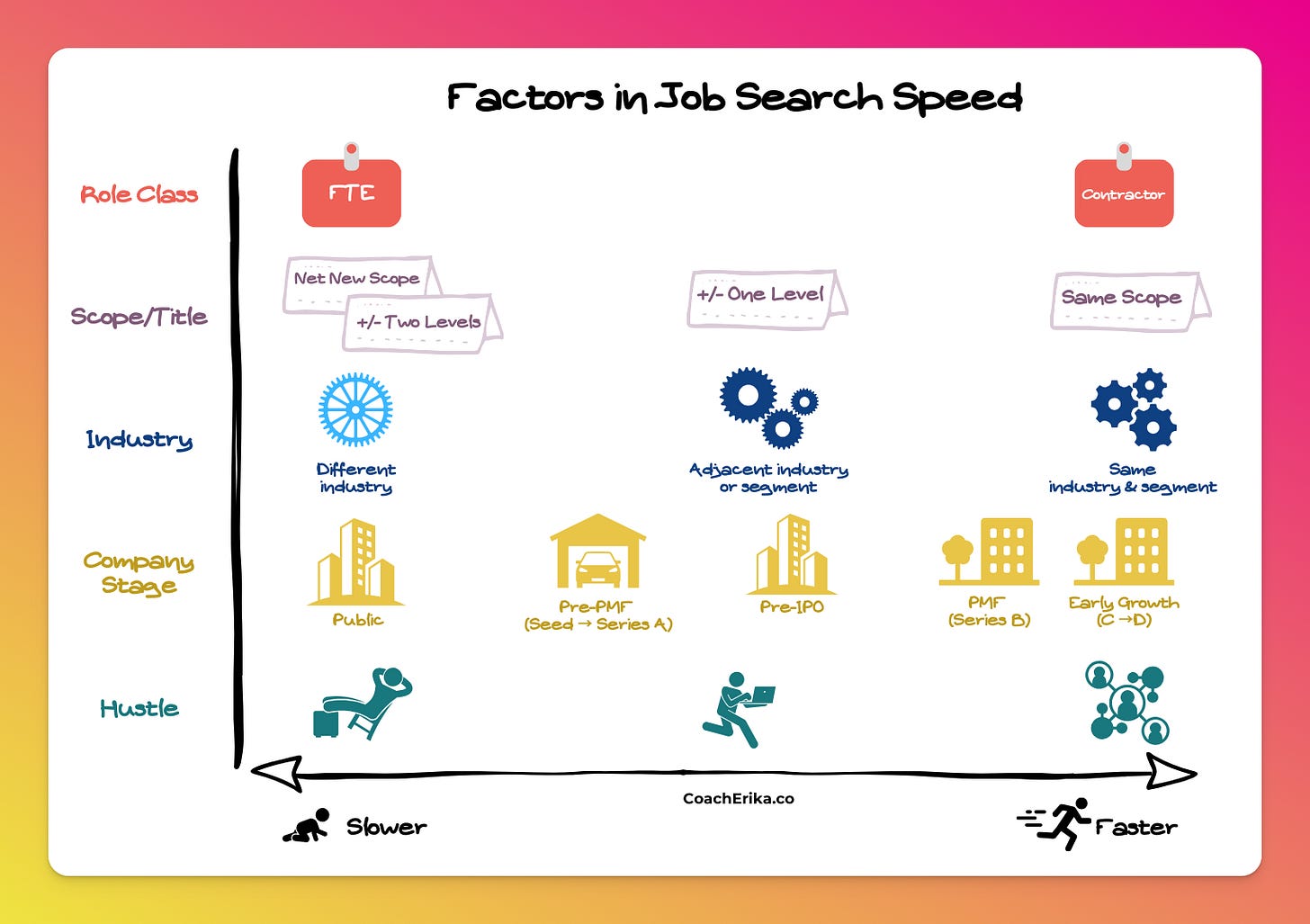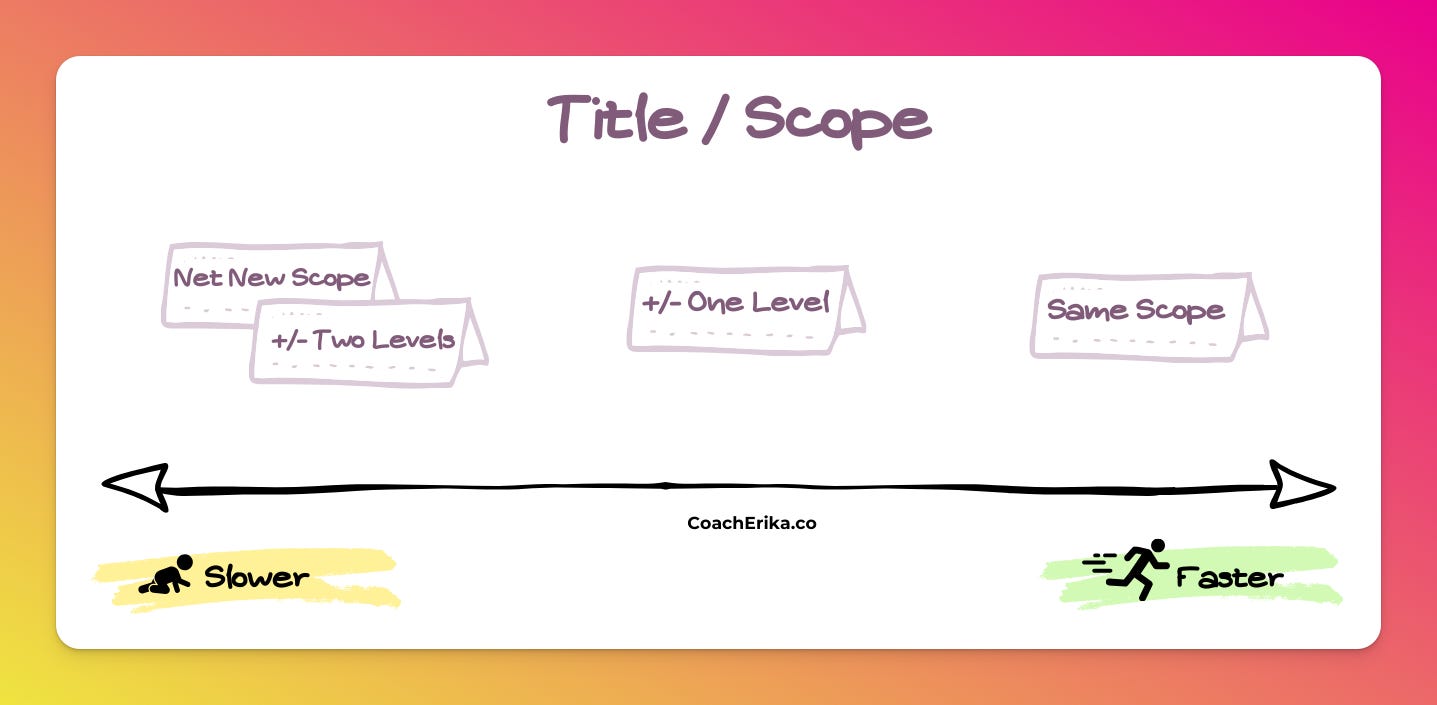How to speed up your job search
Learn how to leverage hustle aptitude, accelerating vs waning industries, and job search sweet spots to design a faster job search.
Hey, it’s 📣 Coach Erika! Welcome to a 🙏 paid subscriber edition🙏 of The Career Whispers. Each week, I tackle reader questions about tech careers: how to get one, how to navigate them, and how to grow and thrive in your role.
If you’re not a subscriber, here’s what you missed this month:
Job Search Diary No.3: Jill-of-all-Trades Airbnb & Uber alum pivoting into Climate
Job Search Diary No.2: Senior Product Designer 8+ months actively searching
Job Search Diary No.1: Staff PM (Twilio, Yelp, Okta) juggling 14 in-flight opportunities
🤩 Job searching? Get set up or unstuck in your job search!
Enrollment is open for my live cohort-based Job Search Design Workshop. Join us to get application-ready and screener-ready with confidence, community, and all the job search tools, tactics, and frameworks I teach in my 1:1 coaching.

Seats are limited to ensure you get individualized attention as part of a small cohort of like-minded tech job seekers to help source opportunities, critique applications and case studies, and mock interviews after the workshop wraps.
And now, onto to the post!
Q: How long will my job search take?
The million-dollar question from tech workers seeking certainty in an uncertain job market.
After helping over 230 job seekers land new jobs in tech over the last 3.5 years, I’ve distilled five primary factors that will most influence the speed of your job search:
Role classification (FTE vs contingent)
Scope/Title (and how much it differs from your previous)
Industry (and how similar it is to your current)
Company stage (their growth posture, number of employees in your target function, and hiring process maturity)
your Hustle aptitude (strategy, networking, willingness to go the extra mile)

These factors influence how swiftly you’ll land a new role. But it's more nuanced than it appears on the surface.
Today, we'll explore the nuances within each factor, as well as some sweet spots to shortcut your job search for those seeking to:
🔝 Level up: increase your scope and/or title
♻️ Re-enter the workforce after a break or intermission
🪜 Pivot into a new role
🏗️ Switch industries
💸 Get a paycheck fast
Let’s dive in ↓
Factor #1: Role Classification
This one's straightforward.
Any non-FTE arrangement (contractors, freelancers, temps) carries far less risk and red tape for employers. Reflecting that, their hiring processes are fast-tracked, and you can land a role more quickly.
🐇 Fastest: contingent (non-FTE)
🐢 Slower: FTE
💡Non-FTE arrangements include temps, independent contractors, seasonal workers, contract employees, on-call workers, or gig workers.

In a difficult capital environment, companies often lean on contingent workers to continue growing and operating without adding to their burdened costs (i.e. headcount).
👀 Worth knowing: contingent workers are typically budgeted for separately from FTEs and have a different impact on the balance sheets and company financials. Contractor funding comes from operating budgets, whereas full-time workers are baked into COGS (cost of goods sold), meaning that they directly impact product margins. In a tight capital environment, companies may grow their contingent workforce to keep costs down and margins up (after all, contractors don’t get benefits or require the same management oversight).
I’ve written about seven situations when it makes sense to take a contractor role over an FTE role, and I suggest reading it if you’re considering using this lever to shorten your job search.
Factor #2: Scope/Title
We’ll focus our discussion on your scope rather than your title because titles vary dramatically between companies. For example, it’s generally accepted that the Director level at Google is the equivalent of VP or higher in a startup. Titles are squishy, so we’ll stick to scope.
When you stick to the scope you know (and have mastered), your job search will be faster. Scope changes (steps up or down) will add friction to your job search.
🐇 Fastest: stay in your scope sweet spot
🐢 Slower: (1) increase scope beyond your demonstrated mastery or (2) decrease scope without a clear, justifiable reason
🐌 Slowest: total scope overhaul (net new function or +/- multiple levels)

But there’s more to consider when it comes to step-ups and step-downs in scope. Let’s discuss.




